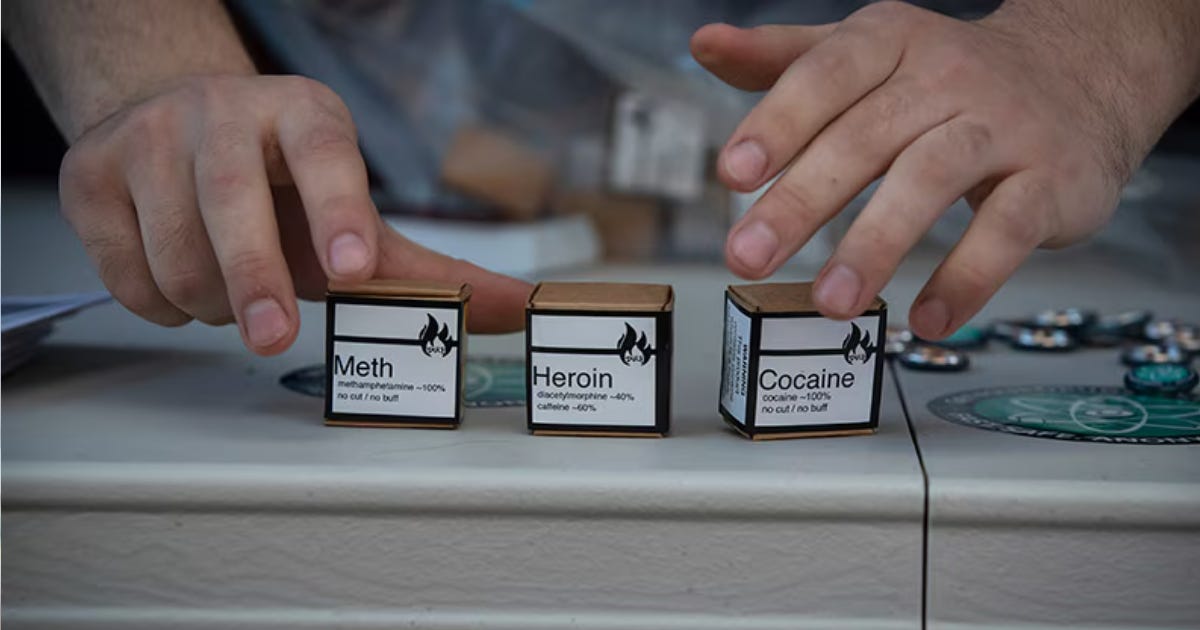Deputy drug minister dodges questions on ‘safe-supply’ policy success rate
The Liberal deputy minister for controlled substances avoided answering Conservative MPs’ questions about the safe supply program and drug law exemptions at consumption sites during a recent hearing.
The Liberal deputy minister for controlled substances avoided answering Conservative MPs’ questions about the safe supply program and drug law exemptions at consumption sites during a recent committee hearing.
Conservative health critic Dan Mazier and other Conservative MPs bombarded deputy minister Kendal Weber during a parliamentary health committee, asking what metrics Liberals use to gauge the success of drug decriminalization, “safe supply” programs, and consumption sites near schools.
When asked if illicit substances such as crack, meth and fentanyl were allowed at safe supply sites, Weber noted that they are consumed there to provide medical aid to individuals in case of overdose.
She said operators of drug consumption sites request an exemption from the Controlled Drugs and Substances Act, which Health Canada reviews and approves. She noted that 65,000 overdoses have occurred at sites exempted from the act and visited more than 5.3 million times, but there have been “no deaths” at the sites.
Weber wouldn’t say if she would reject a supervised drug consumption site in Whitehorse, Yukon, located 200 metres from an elementary school, 300 metres from one daycare and 400 metres from another.
“We will assess it based on public health and public safety, and one of the key components that is involved in an exemption request from the community is consultation with the community,” Weber said. “That will be a key component of the application coming in from the community, to look at community consultation, to look at the public health needs and also the public safety needs.”
She noted Health Canada has no “prohibition in legislation” for drug consumption sites within any distance of schools, leaving the decision to provincial governments. She later added that the distance of sites near schools is “part of the consideration.”
Mazier asked the minister whether Health Canada had received reports of used needles or crack pipes ending up in school or daycare yards next to Liberal-approved drug consumption sites, but Weber said she was unaware of such instances.
In January, True North reported on a safe supply site just 70 metres from a community centre and within the neighbourhood of two elementary schools in Ottawa where parents and community members complained that discovering drug paraphernalia and discarded pill bottles in the area was a constant occurrence.
Weber said Health Canada has funded 31 projects but is no longer funding “safe supply” sites. She said the Substance Use and Addictions program “tests innovative solutions” to the overdose crisis.
“In this case, we did fund the sites, and then it is up to the provinces and territories whether they want to scale up or continue with those safer supply or prescribed alternative sites,” Weber said.
Asked how many “recovery spaces” Health Canada believes are necessary to address the opioid crisis, Weber said the government funds the province’s efforts.
During the health committee, Conservative MP Helena Konanz asked if Weber and Health Canada believed the drug exemption pilot in B.C. had been a success, but the minister again avoided answering directly.
“We continue to monitor the exemption. It expires January 2026. We have not received a request for a renewal of the exemption,” Weber said.
British Columbia’s NDP government requested two amendments to the drug law exemption, which now permits users to possess drugs for personal use in their homes or at consumption sites.
When asked if the program would be extended upon request, Weber stated that Health Canada would “assess public health and safety and look at the indicators” if the province sought renewal.
When asked what metrics are used to determine the success of the program, Weber said the province provides quarterly reports to Health Canada on the utilization of the services, the well-being of drug users, law enforcement data and public awareness and “understanding” of the program.
Konanz noted that Conservatives have received requests from “multiple communities,” including the RCMP, first responders, and police chief unions, to end the program and reverse decriminalization. Weber only responded that the program is a three-year exemption expiring next January.
Mazier asked what circumstances would lead the government to heed calls to end the program. Weber said the government would continue to “monitor it closely” and “engage with stakeholders.”
The Liberal deputy drug minister noted that no other provinces had requested an exemption to the law at the time.
Mazier asked why she thought no other provinces had requested to be a part of the decriminalization program, but again, Weber skirted the question.






This whole thing seems so rigged that my money is on the cartels having the Liberals on their payrolls. Why else are there no sentences for criminals? No law enforcement unless its against free speech? Why are free drugs being handed out like candy to create more addicts? The only answer I have is it must be money - likely bundles of USD stuffed in the floorboards and attics of Liberals...just with trace amounts of meth, fentanyl, coke, heroin, etc...
Thanks JT for giving us this unfortunate PROBLEM!!